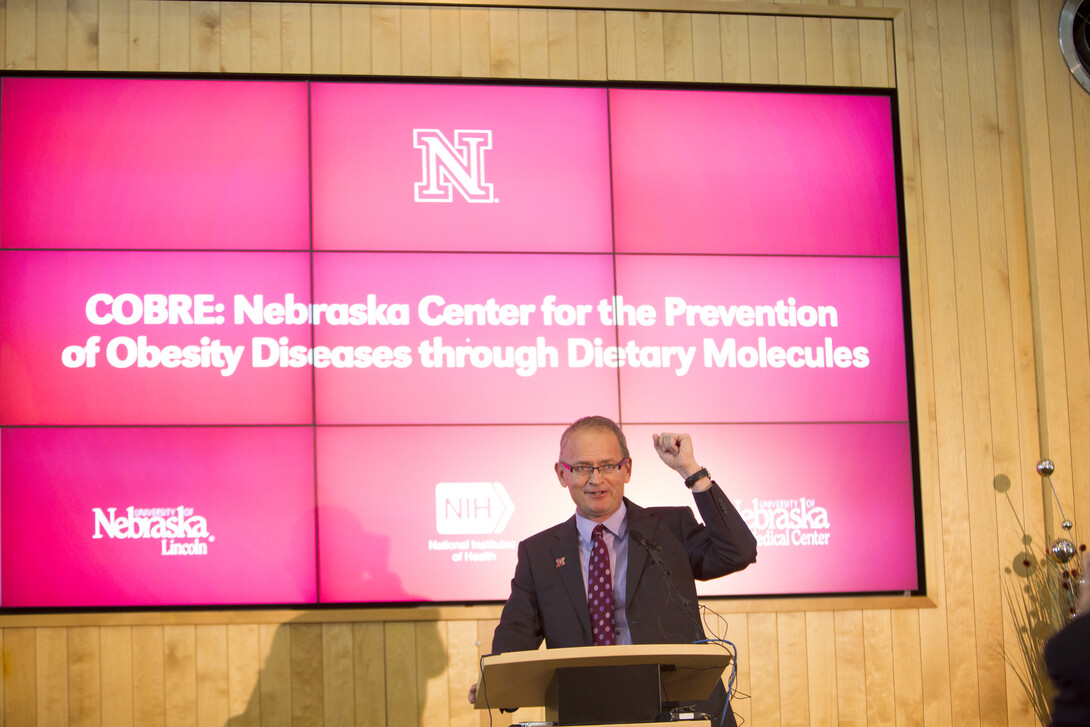
UNL has earned an $11.3 million grant from the National Institutes of Health to establish a research center focused on understanding nutrition and obesity at the molecular level.
A five-year grant from NIH’s Center of Biomedical Research Excellence (COBRE) program will support the Nebraska Center for the Prevention of Obesity Diseases through Dietary Molecules, or NPOD. The COBRE program is funded through the Institutional Development Award (IDeA) Program, which supports health-related research and fosters faculty development and research infrastructure.
“This award recognizes the strong research programs that UNL has built to address the health challenges in obesity and related diseases that our nation faces,” said UNL Chancellor Harvey Perlman. “This is a significant expansion of our capabilities in biomedical research.”
Answering molecular-level questions regarding obesity and related diseases is a crucial first step toward curbing this national epidemic. The center builds on UNL’s strength in nutrition and health research.
The University of Nebraska Medical Center collaborates on the center, which aims to establish a community of nationally recognized researchers in nutrition, genetics, biochemistry, food science, immunology and computer science.
The long-term goal is to become a leader in nutrient signaling and the prevention of obesity and obesity-related diseases, including non-alcoholic fatty liver disease, cardiovascular disease and Type 2 diabetes, said center director Janos Zempleni, Willa Cather Professor of molecular nutrition in the Department of Nutrition and Health Sciences.
“This combined focus makes NPOD unique in the United States and globally,” he said. “Through this center, we’ll develop science-based strategies using dietary compounds to improve human health.”
Nutrient signaling research explores how nutrients initiate biochemical chain reactions that cause a cellular response, including fat storage and disease-causing inflammation. Many nutrient-dependent signaling pathways await discovery and are promising targets for consumer-friendly, cost-effective methods to prevent and treat obesity-related diseases, Zempleni said.
For example, faculty are studying how certain dietary fatty acids activate molecular pathways that turn fat-storing white cells into beige fat cells, which burn calories. Others are investigating how good fatty acids prevent non-alcoholic fatty liver disease; and how diet contributes to the gut microbial flora, which, in turn, inhibit inflammation.
“This new center puts UNL at the cutting edge of new research approaches to preventing obesity-related diseases. It also provides resources for expanding our faculty and facilities,” said Prem Paul, UNL vice chancellor for research and economic development.
To build research expertise, experienced faculty will mentor early career scientists. The center also is developing a centralized research facility in molecular biology, bioinformatics and biostatistics.
“Obesity is a national health crisis that costs the U.S. hundreds of billions of dollars annually in health care expenses and lost productivity,” Zempleni said. “Our research will help address these issues.”
This is UNL’s third NIH Center for Biomedical Research Excellence. The Nebraska Center for Virology was established in 2000 and the Redox Biology Center was launched in 2002. COBRE programs are managed by the National Institute for General Medical Sciences.
Research reported in this story was supported by the National Institute of General Medical Sciences of the National Institutes of Health under award number 1P20GM104320-01A1.








